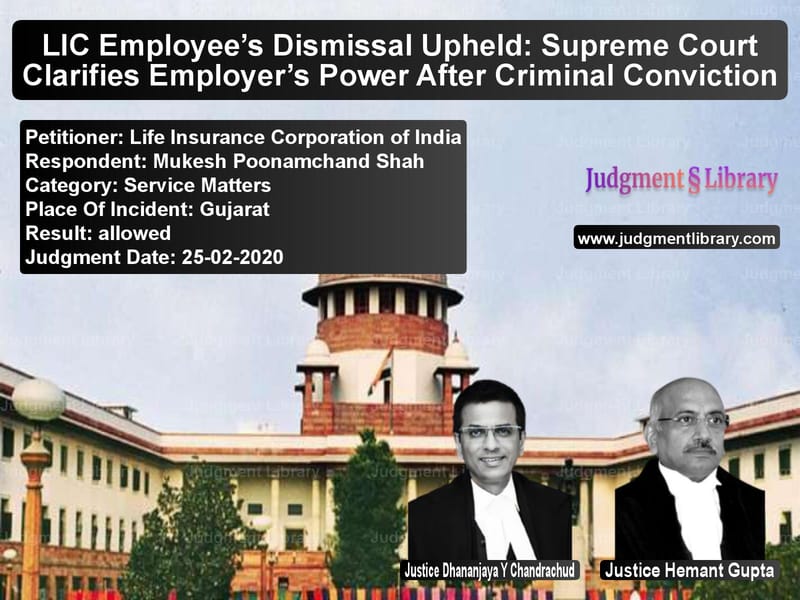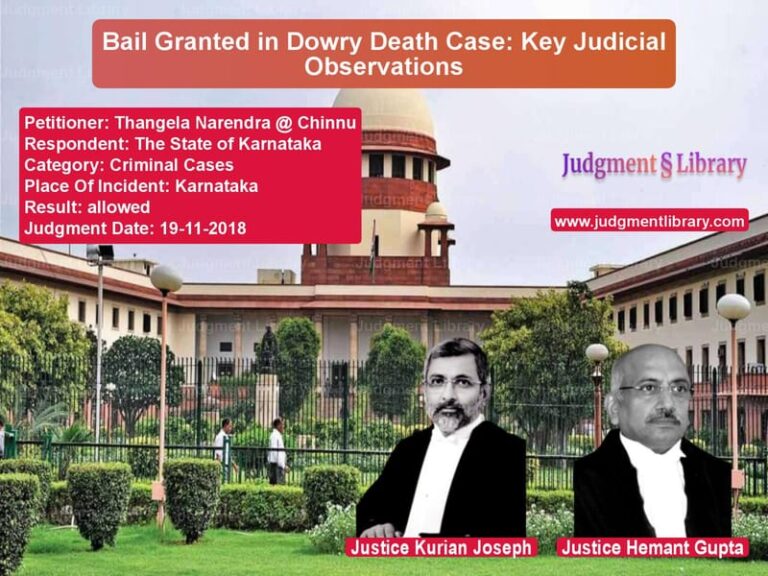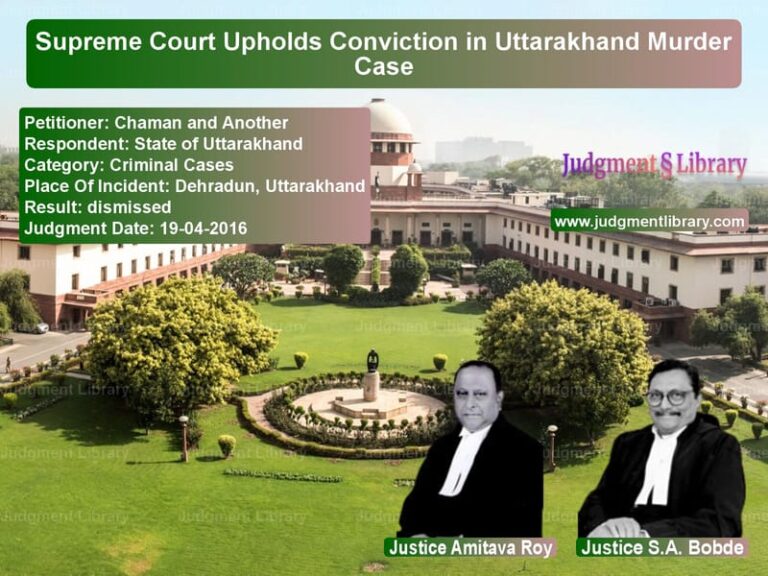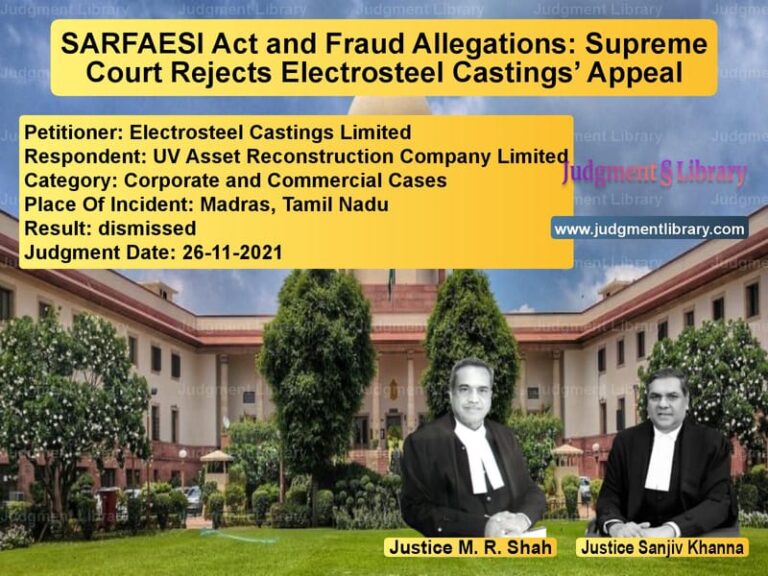LIC Employee’s Dismissal Upheld: Supreme Court Clarifies Employer’s Power After Criminal Conviction
The case of Life Insurance Corporation of India vs. Mukesh Poonamchand Shah concerns the disciplinary action taken against an LIC employee following his conviction for corruption and fraud. The Supreme Court examined whether the employer had the right to remove the employee from service despite the pending appeal against his conviction. This judgment sets an important precedent on the powers of employers in disciplinary matters following a criminal conviction.
Background of the Case
The respondent, Mukesh Poonamchand Shah, was appointed as a Probationary Development Officer at LIC on September 27, 1990, and confirmed in service on December 4, 1991. However, a charge sheet was issued against him on February 16, 1996, alleging serious misconduct related to fake insurance policies.
Key Allegations
The main charges against the respondent included:
- Introducing fake insurance policies for non-existent individuals.
- Certifying a fake school-leaving certificate as genuine.
- Submitting a moral hazard report without proper verification.
Following a departmental inquiry, the charges were found to be proven, and his salary was reduced to the minimum of the time scale.
Criminal Conviction
Parallel to the disciplinary proceedings, the Central Bureau of Investigation (CBI) initiated a criminal prosecution against the respondent and two other LIC employees. He was charged under:
- Prevention of Corruption Act, 1988: Sections 13(1)(d) and 13(2).
- Indian Penal Code, 1860: Sections 120B (criminal conspiracy), 420 (cheating), 467, 468 (forgery), and 471 (using forged documents).
On July 28, 2014, the Special CBI Court convicted him, sentencing him to two years of rigorous imprisonment and a fine of Rs. 5,000 per offense. He appealed against his conviction before the Gujarat High Court, which granted him bail but did not stay the conviction.
LIC’s Disciplinary Action
Following the conviction, LIC issued a notice to show cause why he should not be removed from service under Regulation 39(4)(i) of the Life Insurance Corporation (Staff) Regulations, 1960. This regulation allows an employer to take disciplinary action based on a conviction, independent of other proceedings.
Legal Battle in the High Court
The respondent challenged the show cause notice in the Gujarat High Court. A Single Judge dismissed his plea, ruling that:
- LIC was justified in issuing the notice based on his conviction.
- Since his conviction was not stayed, his plea of double jeopardy was invalid.
However, in a Letters Patent Appeal, the Gujarat High Court’s Division Bench restrained LIC from taking final action until the respondent’s criminal appeal was decided.
Arguments in the Supreme Court
LIC contended that:
- Under Regulation 39(4), they had the right to act upon a conviction, regardless of pending appeals.
- The principle of double jeopardy does not apply, as the first disciplinary action was based on misconduct, while the second was due to criminal conviction.
- The Gujarat High Court’s order prevented them from exercising lawful disciplinary jurisdiction.
The respondent, on the other hand, argued that:
- LIC had already punished him by reducing his pay and could not take further action.
- There was an unexplained delay in issuing the show cause notice.
- Since his sentence was suspended, LIC could not proceed against him.
Supreme Court’s Observations
The Supreme Court upheld LIC’s right to remove the respondent, making the following key points:
- The conviction was not stayed, only the sentence was suspended.
- Regulation 39(4) explicitly allows dismissal based on criminal conviction, even if prior disciplinary action was taken.
- The Gujarat High Court erred in restraining LIC from acting, as it had no legal basis to do so.
Important Judicial Statements
The Court referred to past judgments, reinforcing that:
“Until the said conviction is set aside by the appellate or other higher court, it may not be advisable to retain such person in service.”
It also highlighted that allowing convicted individuals to continue working in public service would erode public confidence and affect morale.
Final Verdict
The Supreme Court set aside the Gujarat High Court’s order and upheld LIC’s right to remove the respondent. It ruled that disciplinary action based on a criminal conviction was legally valid and necessary to maintain institutional integrity.
Petitioner Name: Life Insurance Corporation of India.Respondent Name: Mukesh Poonamchand Shah.Judgment By: Justice Dhananjaya Y Chandrachud, Justice Hemant Gupta.Place Of Incident: Gujarat.Judgment Date: 25-02-2020.
Don’t miss out on the full details! Download the complete judgment in PDF format below and gain valuable insights instantly!
Download Judgment: Life Insurance Corpo vs Mukesh Poonamchand S Supreme Court of India Judgment Dated 25-02-2020.pdf
Direct Downlaod Judgment: Direct downlaod this Judgment
See all petitions in Disciplinary Proceedings
See all petitions in Termination Cases
See all petitions in Judgment by Dhananjaya Y Chandrachud
See all petitions in Judgment by Hemant Gupta
See all petitions in allowed
See all petitions in supreme court of India judgments February 2020
See all petitions in 2020 judgments
See all posts in Service Matters Category
See all allowed petitions in Service Matters Category
See all Dismissed petitions in Service Matters Category
See all partially allowed petitions in Service Matters Category







